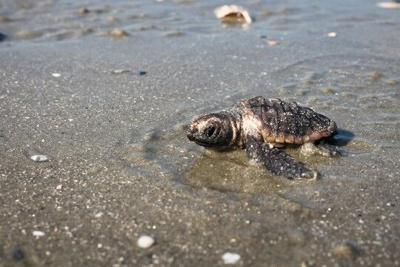EDISTO BEACH — This small Lowcountry beach town has installed a fix for its longstanding problem of disorienting nesting sea turtles with artificial light.
Now, 47 new amber-hued LED lights are illuminating the streets closest to the beach, like Palmetto Boulevard. Town Councilman Jerome Kizer said the lights' longer wavelength avoids confusing the loggerhead sea turtles who navigate by the moon, and they are shielded, so they don't reflect off of other surfaces.
Before, Kizer said, "A lot of the light was thrown behind onto houses and trees, and it just really lit up the night sky."
The work was aided by a $50,000 grant from the U.S. Fish and Wildlife Service, town officials said. Dominion Energy helped the town select the right type of light and did the installation, and the town will pay the utility a small additional amount on its bill every month for the next 10 years because the grant did not cover the entire cost.
Paul Fischer, a spokesman for Dominion Energy SC, said the light switch was "environmentally sound as well as a move towards greater efficiency."
South Carolina turtle officials have said before that Edisto had a particular problem with distracted turtles because so much of the town's built environment is right next to the beach, with no dunes, for example, to potentially block lights.
The loggerhead sea turtles that arrive on South Carolina's beaches every year use the light from the moon as a guide back to the water after laying a nest or after emerging from one as a hatchling. But bright streetlights, or even lights that shine out of private homes, can point the loggerheads in the wrong direction.
That wastes the precious energy of baby turtles, and leads them potentially to the path of cars and other hazards.
At the end of 2020, one South Carolina lawmaker introduced a bill to create special lighting zones along the state's coast for the May 1 to Oct. 31 nesting season. The bill didn't make it out of a state Senate committee in 2021, but still has the chance to advance next year.









